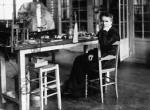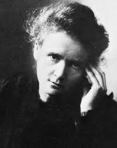I never see what has been done; I only see what remains to be done.
Marie Curie
 Marie Cure was born in 1867 in Poland. In 1871 she left Poland and went to study mathematics physics and chemistry at the University of Paris. During the time of her studies she endured many hardships, also hunger: “[…] I was taught that the way to progress is neither swift nor easy[…]”.
Marie Cure was born in 1867 in Poland. In 1871 she left Poland and went to study mathematics physics and chemistry at the University of Paris. During the time of her studies she endured many hardships, also hunger: “[…] I was taught that the way to progress is neither swift nor easy[…]”.
With the help of her husband Pierre, she was able to conduct pioneering studies on radioactivity, a term that was invented by her, after which Curie gained a Nobel Prize. After the death of her husband in 1906, Marie Curie took his place as Professor of general Physics at the University of paris, and became the first woman to take this job. The continuing research lead her to find 2 new elements: polonium and radio and for that Curie was awarded with a second Nobel Prize in 1911.
After the death of her husband in 1906, Marie Curie took his place as Professor of general Physics at the University of paris, and became the first woman to take this job. The continuing research lead her to find 2 new elements: polonium and radio and for that Curie was awarded with a second Nobel Prize in 1911.
During the first World War she introduced the use of X-Rays into medicine, and organized 20 mobile x-ray stations and 200 stationary.

She was restless and wholly committed to her research being convinced that: “you cannot build a better world without improving individuals”.
She died from radiations in 1934.